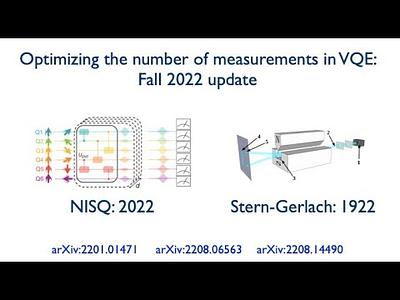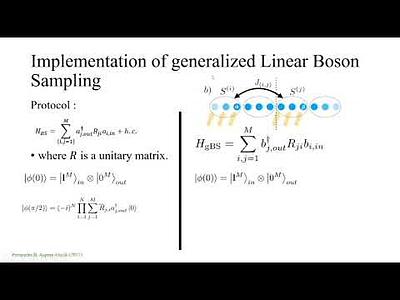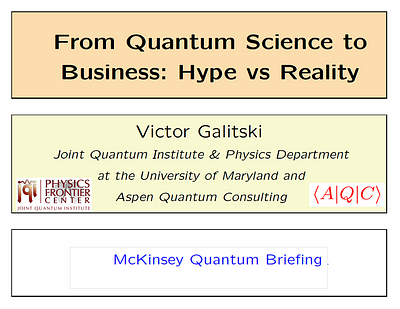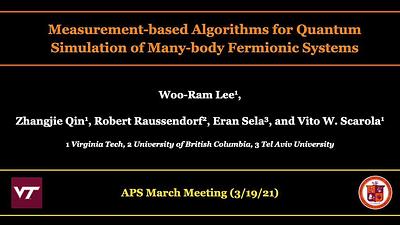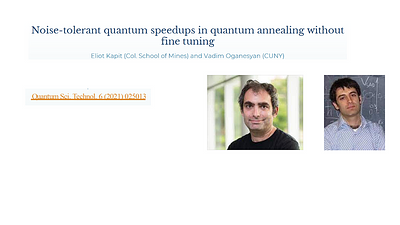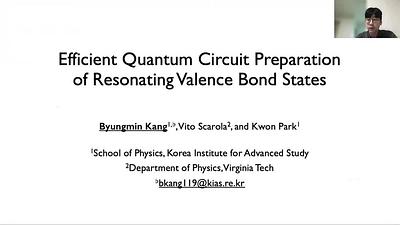By: Seonghoon Choi, Tzu-Ching Yen, Ignacio Loaiza, Artur F. Izmaylov
9 SciCasts by Artur Izmaylov.
By: En-Jui Kuo, Yijia Xu, Dominik Hangleiter, Andrey Grankin, and Mohammad Hafezi
We introduce the notion of "generalized bosons" whose exchange statistics resemble those of bosons, but the local bosonic commutator [ai,a†i]=1 is replaced by an arbitrary single-mode operator that is diagonal in the generalized Fock basis. Examples of generalized bosons include boson pairs and spins. We consider the analogue of the boson sampling task for these particles and observe that its output probabilities are still given by permanents... more
We introduce the notion of "generalized bosons" whose exchange statistics resemble those of bosons, but the local bosonic commutator [ai,a†i]=1 is replaced by an arbitrary single-mode operator that is diagonal in the generalized Fock basis. Examples of generalized bosons include boson pairs and spins. We consider the analogue of the boson sampling task for these particles and observe that its output probabilities are still given by permanents, so that the results regarding hardness of sampling directly carry over. Finally, we propose implementations of generalized boson sampling in circuit-QED and ion-trap platforms. less
By: AQC team
This presentation reviews basics of quantum mechanics, quantum computing, and quantum sensing with an eye on practical applications, if any, of various quantum technologies. It discusses a realistic roadmap, time scales, and challenges facing this space and is intended for a business audience, C-level executives, and investors considering strategic decisions about engaging with nascent quantum technology (or not).
P.S. Supporting video co... more
This presentation reviews basics of quantum mechanics, quantum computing, and quantum sensing with an eye on practical applications, if any, of various quantum technologies. It discusses a realistic roadmap, time scales, and challenges facing this space and is intended for a business audience, C-level executives, and investors considering strategic decisions about engaging with nascent quantum technology (or not).
P.S. Supporting video content, animation, and copies of the accompanying Nature article are available upon request (through the ScienceCast comment section below).
less
By: Woo-Ram Lee, Zhangjie Qin, Robert Raussendorf, Eran Sela, and V. W. Scarola
Quantum simulation using time evolution in phase-estimation-based quantum algorithms can yield unbiased solutions of classically intractable models. However, long runtimes open such algorithms to decoherence. We show how measurement-based quantum simulation uses effective time evolution via measurement to allow runtime advantages over conventional circuit-based algorithms that use real-time evolution with quantum gates. We construct a hybrid ... more
Quantum simulation using time evolution in phase-estimation-based quantum algorithms can yield unbiased solutions of classically intractable models. However, long runtimes open such algorithms to decoherence. We show how measurement-based quantum simulation uses effective time evolution via measurement to allow runtime advantages over conventional circuit-based algorithms that use real-time evolution with quantum gates. We construct a hybrid algorithm to find energy eigenvalues in fermionic models using only measurements on graph states. We apply the algorithm to the Kitaev and Hubbard chains. Resource estimates show a runtime advantage if measurements can be performed faster than gates, and graph states compactification is fully used. In this letter, we set the stage to allow advances in measurement precision to improve quantum simulation. less
By: Eliot Kapit and Vadim Oganesyan
Quantum annealing is a powerful alternative model of quantum computing, which can succeed in the presence of environmental noise even without error correction. However, despite great effort, no conclusive demonstration of a quantum speedup (relative to state of the art classical algorithms) has been shown for these systems, and rigorous theoretical proofs of a quantum advantage (such as the adiabatic formulation of Grover's search problem) ge... more
Quantum annealing is a powerful alternative model of quantum computing, which can succeed in the presence of environmental noise even without error correction. However, despite great effort, no conclusive demonstration of a quantum speedup (relative to state of the art classical algorithms) has been shown for these systems, and rigorous theoretical proofs of a quantum advantage (such as the adiabatic formulation of Grover's search problem) generally rely on exponential precision in at least some aspects of the system, an unphysical resource guaranteed to be scrambled by experimental uncertainties and random noise. In this work, we propose a new variant of quantum annealing, called RFQA, which can maintain a scalable quantum speedup in the face of noise and modest control precision. Specifically, we consider a modification of flux qubit-based quantum annealing which includes low-frequency oscillations in the directions of the transverse field terms as the system evolves. We show that this method produces a quantum speedup for finding ground states in the Grover problem and quantum random energy model, and thus should be widely applicable to other hard optimization problems which can be formulated as quantum spin glasses. Further, we explore three realistic noise channels and show that the speedup from RFQA is resilient to 1/f-like local potential fluctuations and local heating from interaction with a sufficiently low temperature bath. Another noise channel, bath-assisted quantum cooling transitions, actually accelerates the algorithm and may outweigh the negative effects of the others. We also detail how RFQA may be implemented experimentally with current technology. less
By: Byungmin Kang, Vito W Scarola, Kwon Park
When studying strongly correlated systems using quantum circuits, it is important to prepare good initial states from which the target many-body states can easily be accessed. Here, we discuss an efficient quantum circuit preparation of the resonating valence bond (RVB) state, which plays an essential role in understanding the high-Tc superconductivity and the spin liquid physics. It is known that the RVB state is given by the Gutzwiller proj... more
When studying strongly correlated systems using quantum circuits, it is important to prepare good initial states from which the target many-body states can easily be accessed. Here, we discuss an efficient quantum circuit preparation of the resonating valence bond (RVB) state, which plays an essential role in understanding the high-Tc superconductivity and the spin liquid physics. It is known that the RVB state is given by the Gutzwiller projection of a Bardeen-Cooper-Schrieffer (BCS) state for which an efficient quantum circuit construction is known. However, since the overlap between the RVB state and the BCS state decays exponentially in the system size, naive implementation of the Gutzwiller projection as projective measurements in quantum circuit would require exponentially many repetitions in order to obtain the RVB state. In this talk, we discuss how to systematically amplify the amplitude associated with the RVB state in the BCS state using a recently developed amplitude amplification technique. Following our construction, one can construct a quantum circuit for the RVB state with an arbitrarily high success probability. less
